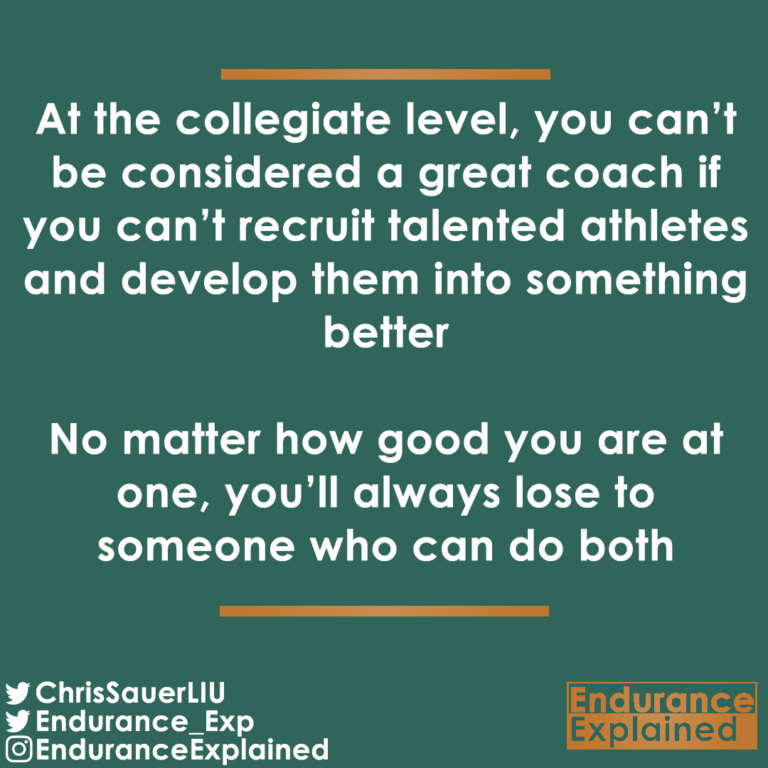What Makes a Great College Coach?

At the collegiate level, people constantly mistake athlete development for coaching. It’s an honest mistake. We know that coaching involves making an athlete better than they were the day before and so it makes sense to think that the best coaches are the ones that improve their athletes the most. But that isn’t the full picture. In a world where everyone starts out at a different baseline and colleges have a variety of resources to offer, recruiting will always play a role.
A Tale of Two Coaches
Let’s imagine we have two coaches in front of us: Coach A and Coach B. They both have identical resources, same number of scholarships, equally desirable locations, academically equivalent, etc. In this hypothetical world it is truly a clone of one another as far as what they can offer aside from themselves.
Coach A consistently brings in 2-3 athletes every year that run 4:00 in the mile and he consistently develops them into 4:08 milers.
Coach B consistently brings in only 4:40 milers every year but routinely develops them into 4:15 milers.
Which Coach is Better?
You might not like hearing this, but Coach A is the better coach. It isn’t close either.
Wait, how is that possible? Coach A is terrible, he is making all of his kids slower. There’s no way he can be considered the better coach.
If these two teams faced each other, B’s team will never win a meet against A. They will be incredibly proud of their own improvements, but they will never finish ahead of the other team.
Recruiting is part of the puzzle. We seem to forget that when we appraise a coach’s ability, but hold it against them when we see a talented runner not live up to their potential. If Coach B is such a bad recruiter that he/she cannot land someone faster than a 4:40 despite their success, then they are too deficient in a crucial part of the job that they can’t be considered as good as another coach that out recruits them and merely keeps them good enough.
At the collegiate level, you can’t be considered a great coach if you can’t recruit talented athletes and develop them into something better. No matter how good you are at one, you’ll always lose to someone who can do both.
Is it Better to be Great at Recruiting or Athlete Development?
He’s absolutely right. Talented athletes have a crazy high ceiling. Part of what made them good in high school is their genetic ability to improve. That quality doesn’t go away in college so it becomes this cycle of getting high level athletes and being able to turn them into even higher level athletes even without perfect training.
Most high school boys that run 4:10 in the mile aren’t “tapped out” or “near their peak,” they are athletes with the capacity to adapt to training more strongly than the average runner. On the other side of the coin, most boys that have run for four years and haven’t broken 5-miuntes aren’t untapped potential, most just don’t have the same ability to absorb training.
